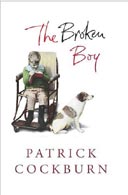
The Broken Boy
by Patrick Cockburn
Jonathan Cape
£15.99, pp320
Here are three slim volumes interwoven. One is a story of Anglo-Irish social attitudes frozen in time. Another is a potted portrait of the Cockburn literary clan: of Patrick's brothers, Andrew and Alexander, and their dad, Claud, the spiritual father of bloggers everywhere as he banged scabrously away on his old Underwood typewriter.
But the third tale is the one that matters. It begins in sun-flecked rural tranquillity and ends with dozens of children paralysed or dead, the broken boys and girls of the last great polio epidemic in these islands.
In 1955, American scientist Dr Jonas Salk finally produced a vaccine which protects against infantile paralysis, but two years on, it has not reached east Cork. The NHS hasn't embraced it yet and Dublin follows London's lead. So, because the virus works to a malign three-year cycle, the absolutely predictable is absolutely happening.
St Finbarr's Hospital in Cork and its orthopaedic twin are packed already. The doctors in charge make the usual quasi-reassuring noises that doctors make when they don't know what to do. And here, in the walled enchantment of Brooke Lodge, with its beautiful gardens and servants, come the Cockburns, back from working exile in Hampstead.
Claud, desperate to fund a wife with a hunting habit and children with a public-school fees problem, is churning out pieces for Punch. Should Claud and Patricia have taken more notice of Cork's polio crisis? Of course. But Brook Lodge seems a very safe place to them, far away from the sickness and poverty of the big city.
And they don't know much about how polio spreads: swiftly, undetectably, from mouth to mouth, sometimes repulsed when it invades the motor neurons so that nobody knows they've got it, sometimes with an itch of the fingertips, then a headache and burning fever, turning dangerous or lethal, especially for middle-class kids whose lack of exposure to dirt makes their bodies less likely to build up resistance to infection.
Patrick is six, a cheerful, cosseted lad marked one-to-one by his nanny Kitty while Mum goes riding and Claud churns out his pieces. Suddenly, though, he has the fever. Suddenly, his whole life turns on its head. He is alone, utterly alone. He is one of a crowd of victims. He is a cripple. He'll be a cripple forever.
Cockburn develops this moment of despair in two distinct ways. The first, with grace and precision, is to tell us how he felt and who and what he remembers. He remembers the thin, grey, hospital slop of minced meat and potato; the fear of tyrant nurses snapping his head off (so that when he shits in his bed by mistake, he wraps it in a copy of the Beano and hurls it down a darkened ward). He remembers the frail radio headphones that link him to an outside world, the twice-a-week visits from his mother and father, the ward tours by lordly consultants brooking no questions nor arguments.
This is wonderful writing and wincingly true. I know because, in an earlier, mainland epidemic, I was the lad in the iron lung and then the plaster bed, unable to move and far from home. I remember the headphones and the soggy toast and Dr Malkin on his touring pedestal and the sanctuary of physiotherapy, where Miss Butters and Miss White were human beings who helped make your psyche whole. Was Ireland 1956 any different to Leicestershire 1948? Not much. The ordeal, strangeness and fear were the same.
But the second strand of Cockburn's book is harder-edged and more insistent. Fifty years on, his illness still rankles. The lordly consultants may be on more celestial duty, but he still wants answers. What exactly did so many suffer from, and why? The broad job of explanation has been done before but never in such sharp, fierce focus. Patrick Cockburn has been back to Cork to talk to the physiotherapists and doctors and patients who were there and remember.
He wants to understand why the simple precautions of separation and sanitisation that could have slowed polio's spread weren't taken, why the sports crowds from Dublin were still allowed in, why one suburb was blighted and another escaped, why the local newspapers sounded no alarms and named no names; why, in short, as many as 50,000 children and adults had polio that summer, yet nobody knew the full toll.
It is a brilliant reporting job, full of lessons and echoes. You can watch the febrile platitudes of chief medics and ministers turning to dust on their lips. Welcome to the modern world of Aids or Sars. Welcome to chaos, confusion and a tourist trade which needs visitors to survive. Welcome to the grisly hinterland where politics and medicine meet.
But for all its eloquent analysis, Cockburn's real edge is still personal and raw. He can't forgive his parents for putting him in peril. He can't forget his suffering or the fear of debilitating post-polio syndrome to come. He can't agree with well-meaning people who think that adversity builds character. He wants us to feel his pain.
We do, but, again, in personal ways. Did I blame my father? Hardly. He died of polio three days before my fever struck (though I may have given it to him). Did months and years in hospital build character? Maybe. Mostly, they bred forgetfulness, a blanking out of my life before I was ill.
Cockburn's gift lies not in generalising his experience but keeping it passionately particular, a tragedy to compare and contrast. I understand now more clearly than ever what struck me down. I can relate that to other epidemics in other times. I can accept a place in the malign scheme of things.
Patrick Cockburn has pulled off something remarkable. And, please, does he ever pause and ponder and ask himself: without all that, could I have done all this?

